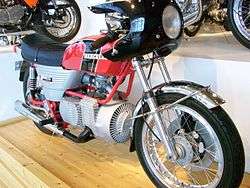Hercules W-2000
 | |
| Manufacturer | Hercules (DKW in some markets) |
|---|---|
| Production | 1974–1977 |
| Engine | Air-cooled 294 cc Wankel |
| Compression ratio | 8.5:1 |
| Top speed | 140 km/h (90 mph) |
| Power | 27–32 hp (20–24 kW) @ 6,500 RPM (claimed)[1]:82[2]:276 |
| Torque | 24.5 lb·ft (33.2 N·m) @ 4,500 RPM |
| Transmission | Six-speed, wet clutch, chain drive |
| Suspension | Telescopic fork |
| Brakes |
Front: 11.8 in (300 mm) disc Rear: 7.0 in (180 mm) drum |
| Wheelbase | 54.5 in (1,380 mm) |
| Seat height | 30 in (760 mm) |
| Weight |
381 pounds (173 kg) (dry) 390 pounds (180 kg) (fuel half full) (wet) |
| Fuel capacity | 4.5 US gal (17 l; 3.7 imp gal) |
| Oil capacity | 4.0 US pt (1.9 l; 3.3 imp pt) |
| Fuel consumption | 40 mpg‑US (5.9 L/100 km; 48 mpg‑imp) |
The Hercules W-2000 was a motorcycle made by Hercules in Germany. It was the first production motorcycle with a Wankel engine.[3][4][1]:83[notes 1]
It was designed in the late 1960s,[4] first shown at a German trade show (Internationale Motorrad- und Fahrrad-Ausstellung [international motor- and bicycle show][6]) in 1970, and production started in 1974. Production halted in 1977 after 1,800 were built and the tooling was sold to Norton Motors.[1]:83[7]
Development
Fichtel & Sachs, which became Hercules' parent company, was the second licensee of the Wankel engine, on Dec 29, 1960, and Sachs was the first motorcycle manufacturer with a license.[8] Sachs had prior experience with Wankel applications in personal watercraft and power tools. The 1970 Hercules motorcycle prototype had shaft drive.[8] It may be on display at Zentrum Industriekultur in Nuremberg.[6]
Specifications
Information in the specifications box are from Cycle World unless noted.[9]:71
Engine
The engine was an air-cooled single-rotor Wankel designed by Sachs as a snowmobile engine, that produced 27–32 hp (20–24 kW) at 6,500 RPM.[5][1]:82[2]:276 The rotor spun about the frame's longitudinal axis (see longitudinal engine for the piston-engine equivalent), with power taken to the transmission through a 90° bevel gear.[10][9]:71
Fuelling was originally supplied by a 32 mm Bing carburetor.[5] An electric starter with backup kick starter was standard.[9]
Gasoline had to be premixed with two-stroke oil until 1976, when 199 more units were produced with automatic oil injection.[7][10]
Reception and legacy
A contemporary Cycle World review summarized the machine this way: "Less performance for more money takes this rotary out of the realm of practicality."[9]:66 It received criticism for insufficient ground clearance and unimpressive acceleration.[4]
A Rider retrospective written in 2015 called it an "exercise in simplicity, with clean, spare design that projects industrial efficiency", especially in contrast to the overbuilt Suzuki RE5, while noting both rotary powered machines are "'orphan bikes'...innovative but not commercially successful."[10] Another 2008 retrospective noted the high insurance costs (due to erroneous swept volume calculation ranking it with high-risk literbikes) and said "Every buyer with an ounce of common-sense, or logic, avoided the Hercules like the plague and the bike sold only to real biking geeks who delighted in the absurdly quirky."[11]
In collections
Examples are at the Deutsches Museum in Munich, Germany; Deutsches Zweirad- und NSU-Museum in Neckarsulm, Germany; Museum Autovision in Altlußheim, Germany; Barber Vintage Motorsports Museum in Birmingham, Alabama; Motorcyclepedia Museum in New York; National Motorcycle Museum in Iowa; and a museum in Grassmere, Australia.[4][10][12][13][14]
Notes
- ↑ The Suzuki RE5 was sold in the United States first.[5]
References
- 1 2 3 4 Hege 2002.
- 1 2 Ayton 1983.
- ↑ Beeden 2014.
- 1 2 3 4 Williams 2012.
- 1 2 3 Hill 1975.
- 1 2 "Hercules", Der Wankelmotor (website), 2000–2015, retrieved 2015-08-05
- 1 2 Shea 2014.
- 1 2 d'Orléans, Paul (November 3, 2011), "A short history of Wankel motorcycles", The Vintagent
- 1 2 3 4 Cycle World 1976.
- 1 2 3 4 Williams 2015.
- ↑ Melling, Frank (December 17, 2008), Memorable Motorcycles: Hercules W2000, Motorcycle USA
- ↑ "1975 Hercules rotary engine motorcycle", National Treasures (blog), Motorcycle Classics
- ↑ Felix Wankel – Erfinder aus Leidenschaft 25.5.2012 – 27.1.2013 (PDF) (flyer), Deutsches Zweirad- und NSU-Museum, 2012
- ↑ Collins 2014.
- Print sources
- Hill, Ray (1975), "Europe's Hercules 2000: Rotary-powered motorcycle", Popular Science, 207, p. 44
- "Hercules Wankel 2000: Less performance for more money takes this rotary out of the realm of practicality", Cycle World, p. 65–71, March 1976
- Ayton, Cyril (1983), The History of motor cycling, Orbis, ISBN 9780856135170
- Hege, John B. (2002), The Wankel Rotary Engine: A History, McFarland, ISBN 9780786429059
- Williams, Greg (March 2012), "Hercules W-2000: The First Rotary-Powered Motorcycle", Motorcycle Classics
- Collins, Peter (June 28, 2014), "Rare engine a museum piece", The Warrnambool Standard, Warrnambool, Victoria: Fairfax Media
- Beeden, Alexandra, ed. (2014), Hot Bikes, Penguin, p. 187, ISBN 9781465430885
- Shea, Terry (October 2014), "1976 Hercules W-2000: The original Wankel-powered motorcycle remains distinctive, 40 years on", Hemmings Motor News
- Williams, Scott A. (March 4, 2015), "Hercules W2000 and Suzuki RE5—Short History of Wankel-Powered Motorcycles", Rider, archived from the original on July 10, 2015
External links
| Wikimedia Commons has media related to Hercules W2000. |
- Hercules Wankel Owners' Club
- Top 10 Wankel engined bikes, Visordown, 2015
- 1976 Hercules W2000, HowStuffWorks